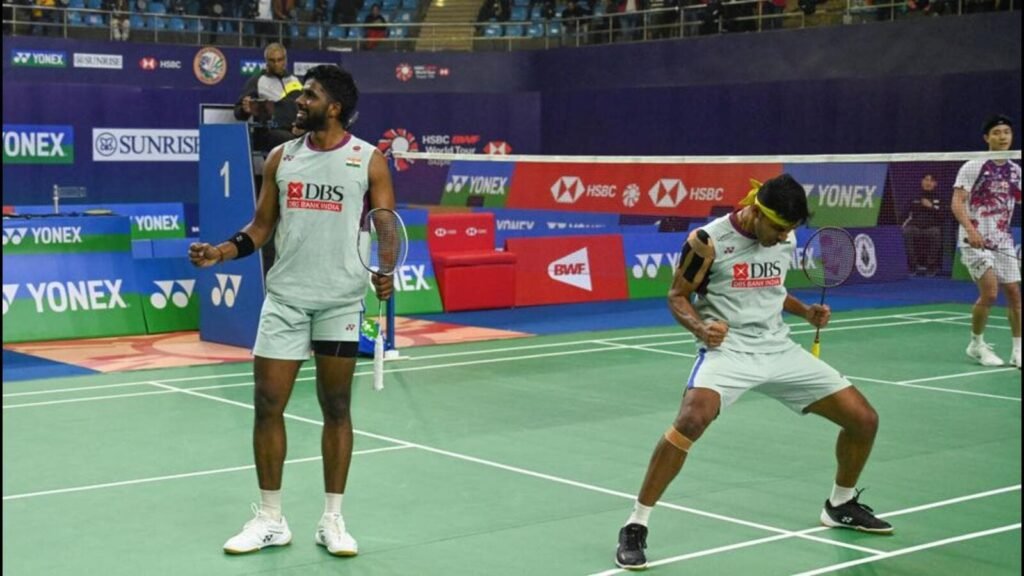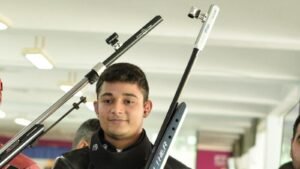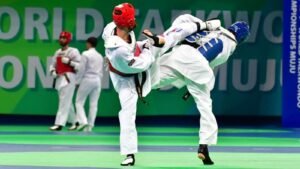
New Delhi: There was an unusual lull at the KD Jadhav Indoor Stadium here on Friday. With crowd favorite PV Sindhu and Kiran George getting knocked out in the quarter-finals, fans were feeling a little disappointed at the $950,000 India Open. But all hope wasn’t lost.

As is the case in most badminton events these days, Satwiksairaj Rankireddy and Chirag Shetty continued India’s run into the business end of the Super 750 tournament, raising the decibel levels around the 5,000-seater arena.
Rankireddy and Shetty barely broke a sweat to oust South Korean combine, Jin Yong and Kang Min Hyuk (who had won India Open last year with Seo Seung-Jae), 21-10, 21-17 in 41 minutes to advance to the men’s doubles. semi-finals.
“Right from the get-go, we were all guns blazing. That’s what we wanted to do. As you could see in the end, if we were a bit slow, they could capitalize by maneuvering the shuttle around. We wanted to prevent them from getting back into the game. I’m happy we stuck to the plan until the end,” said Shetty.
Guided by Malaysian coach Tan Kim Her, Rankireddy and Shetty stayed on course for their second consecutive India Open final. Playing a clinical match against the South Koreans, who had upset the top seeds and world No.1 combine Kim Astrup and Anders Skaarup Rasmussen of Denmark in the opener, the Asian Games gold medalists raced to a 9-1 lead and then controlled proceedings to pocket the game in 18 minutes.
Buoyed by a vociferous crowd, Rankireddy and Shetty took a 14-8 lead in the second game but Kang and Jin put up a stronger fight. The South Koreans slowed down the game and used the lack of drift to push the shuttle to the rear of the court and win points at the net to level the scores at 16-all.
But the Indian pair never looked under pressure. They realized what was happening, increasing the tempo, decreasing the time taken between points to not allow Kang and Jin any chance of pushing the contest into a decider. They started changing directions, alternating forehand and backhand with the shuttle criss-crossing the court regularly.
Rankireddy and Shetty stopped lifting the shuttle and were easily the better pair when it came to flat exchanges, clinching the game and match.
“We were comfortable even though it was getting close. We knew that if we kept the pressure on, they wouldn’t sustain it. It was our mistakes in the last three points that brought them close. But there was no tension,” said Rankireddy.
In the semi-final, the 2022 champions will face Malaysian third seeds Sze Fei Goh and Nur Izzuddin. The Indians have a 6-1 record against them.
Sindhu, Kiran go down
Earlier, Sindhu went down 21-9, 19-21, 21-17 in an hour and two minutes against fourth seed and Paris Olympics bronze medalist Gregoria Mariska Tunjung in the women’s singles quarter-final. In men’s action, Kiran’s dream run came to an end after Weng Hong Yang of China defeated him 21-13, 21-19.
Despite the loss, there were positives to take home for Sindhu. The 29-year-old struggled with her movement in the opening game but took the fight to her opponent once she found her range. She was trailing 3-9 in the second before starting a fightback, pushing Tunjung to the back of the court, nullifying the sharpness of the Indonesian’s quick slice drops. She kept the shuttle long enough in play to force an error from her opponent.
She caught up with Tunjung at 9-9 and though both the players stayed neck-and-neck, Sindhu managed to take the match into a decider by forcing the fourth seed into taking more risks to win points.
The former champion continued with the same strategy in the decider and looked like scripting an upset with both players locked at 17-17. But some brilliant strokeplay from Tunjung and a wrong judgment call from Sindhu ended up deciding the fate of the match.
“It was 17-17 in the third game where some of my strokes were just too parallel and into her hand. If I had played a bit more back, maybe that would have been the difference,” said Sindhu.







